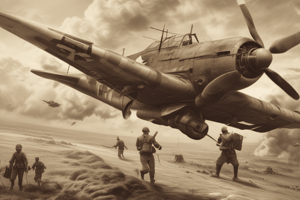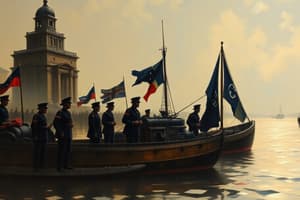Podcast
Questions and Answers
Jaký byl původní název osy tří hlavních mocností na mapě?
Jaký byl původní název osy tří hlavních mocností na mapě?
- Páků osa
- Osa Německa-Itálie-Japonska
- OsaBerlína-Roma-Tokyo
- Osa sever-jih (correct)
Kdo byl vůdčí osobností Německa během druhé světové války?
Kdo byl vůdčí osobností Německa během druhé světové války?
- Hirohito
- Benito Mussolini
- Adolf Hitler (correct)
- Joseph Stalin
Který mírový svazek přispěl k vzestupu Adolfa Hitlera k moci v roce 1933?
Který mírový svazek přispěl k vzestupu Adolfa Hitlera k moci v roce 1933?
- Druhá Vídeňská arbitráž
- Versailleský mír (correct)
- Mnichovská dohoda
- Paktu o neútočení
Který stát byl nejagresivnějším členem osy moci?
Který stát byl nejagresivnějším členem osy moci?
Která událost v roce 1939 vedla k vypuknutí druhé světové války?
Která událost v roce 1939 vedla k vypuknutí druhé světové války?
Které státy se kromě Německa, Itálie a Japonska připojily k osi moci?
Které státy se kromě Německa, Itálie a Japonska připojily k osi moci?
Který rok se Itálie, vedená Benitem Mussolinim, připojila k mocnostem Osy?
Který rok se Itálie, vedená Benitem Mussolinim, připojila k mocnostem Osy?
Jaký byl jeden z důvodů, proč Japonsko vojensky expandovalo do Číny a Tichomoří?
Jaký byl jeden z důvodů, proč Japonsko vojensky expandovalo do Číny a Tichomoří?
Kdy Spojené státy vstoupily do války?
Kdy Spojené státy vstoupily do války?
Která bitva byla svedena během války v Evropském divadle?
Která bitva byla svedena během války v Evropském divadle?
Kdo byla hlavní síla, která porazila mocnosti Osy?
Kdo byla hlavní síla, která porazila mocnosti Osy?
Kdy skončila druhá světová válka?
Kdy skončila druhá světová válka?
Flashcards are hidden until you start studying
Study Notes
World War II: The Axis Powers
Introduction
World War II (1939-1945) was a global conflict involving numerous countries and territories. It was marked by significant events, including the rise of European dictators, the invasion of Poland by Germany, and the attack on Pearl Harbor by Japan. The war was fought between the Allies, primarily consisting of the United States, Great Britain, and the Soviet Union, and the Axis powers, which included Germany, Italy, and Japan. In this article, we will focus on the Axis powers, their background, and their role in the war.
The Axis Powers
The Axis powers were a military alliance of three major European powers: Germany, Italy, and Japan. They were initially joined by other countries, including Hungary, Romania, Slovakia, and Bulgaria. The term "Axis" originated from the geographical position of the three major powers on a map, with Germany at the north, Italy at the center, and Japan at the south.
Germany
Germany, under the leadership of Adolf Hitler and the Nazi Party, was the most aggressive of the Axis powers. Hitler's rise to power in 1933 was aided by the Treaty of Versailles, which ended World War I and imposed heavy reparations and restrictions on Germany. The treaty created an atmosphere of resentment and humiliation among the German people, which the Nazis capitalized on to gain popularity. Germany's aggressive expansionist policies, including the invasion of Poland in 1939, led to the war.
Italy
Italy, led by Benito Mussolini, joined the Axis powers in 1936. Mussolini's fascist regime sought to restore the glory of the Roman Empire and expand Italy's territory. The Italian invasion of Albania in 1939 brought them into the war alongside Germany and Japan.
Japan
Japan's militaristic government, led by Emperor Hirohito, sought expansion into China and the Pacific. Japan's attack on Pearl Harbor on December 7, 1941, drew the United States into the war. Japan's aggressive expansionist policies, including the invasion of Indochina and the Philippines, further escalated the conflict.
The War
The war between the Axis powers and the Allies was fought on multiple fronts. The European theater involved the German invasion of the Soviet Union, the Battle of the Bulge, and the Allied invasion of Italy. The Pacific theater saw intense fighting in the Philippines, New Guinea, and the Battle of Okinawa. The war ended in 1945 with the unconditional surrender of the Axis powers.
Conclusion
The Axis powers, consisting of Germany, Italy, and Japan, played a significant role in World War II. Their aggressive expansionist policies led to the invasion of Poland, the attack on Pearl Harbor, and the entry of the United States into the war. The Axis powers faced the combined might of the Allies, particularly the United States, Great Britain, and the Soviet Union, and were eventually defeated. The war had a profound impact on global history, shaping the political, social, and economic landscape of the world.
Studying That Suits You
Use AI to generate personalized quizzes and flashcards to suit your learning preferences.




